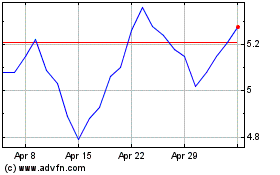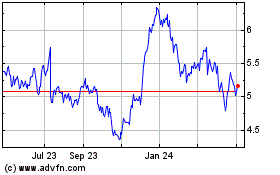5G's Growing Costs Sting Swedish Telecom Giant Ericsson -- Update
January 24 2020 - 7:37AM
Dow Jones News
By Dominic Chopping and Parmy Olson
STOCKHOLM -- Ericsson AB returned to profit in the fourth
quarter but concerns about higher costs associated with new
fifth-generation mobile networks and a slowdown in North America
sent its shares down more than 7%.
The Swedish telecom-equipment maker, emerging from years of
costly restructuring, has bet big on the growing 5G market, where
it is battling Finland's Nokia Corp. and China's Huawei
Technologies Co. That effort, and cost cuts elsewhere, have started
to bear fruit in recent quarters.
However, Ericsson on Friday said momentum stalled in North
America in the last three months of 2019, with sales in the region
falling 4% compared with the previous year.
"Due to the uncertainty related to an announced operator merger,
we saw a slowdown in our North American business," said Chief
Executive Börje Ekholm, adding that the region generated "the
lowest share of total sales for some time."
T-Mobile US Inc. and Sprint Corp. agreed to merge almost two
years ago but the deal hasn't been finalized amid a protracted
antitrust fight.
Ericsson said there was growth among other customers and that
the underlying fundamentals in North America remain strong. It also
said the slowdown in North America was offset by operators in Asia
and the Middle East continuing to spend on 5G networks.
Still, investments associated with the new technology, which
promises to supercharge cellphones and ultimately enable driverless
cars and internet-controlled factories, are increasing costs.
Ericsson said its costs rose in the quarter as it invested in
acquisitions, digitization and security, and warned expenses would
continue to rise this year. While the company said higher costs
won't jeopardize its financial targets, Citi analyst Amit
Harchandani said he expects consensus earnings this year to move
lower.
Despite the challenges, Ericsson reported a net profit of 4.43
billion Swedish kronor ($465 million) for the fourth quarter, up
from a loss of 6.55 billion kronor in the same period last year.
Sales rose 4% to 66.37 billion kronor, driven by its key networks
unit, and the company raised its full-year dividend.
Ericsson said it now has 78 commercial 5G agreements with
operators and 24 live 5G networks on four continents.
Analysts have raised expectations that Ericsson and Nokia might
benefit from a U.S. push to discourage allied governments and their
carriers from buying Huawei gear. The U.S. says Huawei's equipment
could be commandeered by Chinese authorities to disrupt or spy on
communications, an allegation the company denies.
However, while Huawei is shut out of America, its absence has
only given way to fierce competition between the two European
companies. Ericsson also says it is yet to see much benefit
elsewhere in the world.
Mr. Ekholm said in an interview with The Wall Street Journal
earlier this week that adoption of 5G is "actually slowing down, in
many countries" because of geopolitical concerns around the use of
Huawei equipment. "That has created more uncertainty for our
customers," he said, adding, "This whole notion that this was a win
for Ericsson and Nokia so far has not materialized."
Against that backdrop, Ericsson is pushing to make the most of
the U.S.
At a dinner with President Trump and other CEOs at the World
Economic Forum in Davos, Switzerland, this week, Mr. Ekholm
directly asked the president to make more spectrum available to
mobile operators to help boost 5G deployments. He added, according
to a transcript of the event, that permitting processes were "a
real restriction."
Write to Dominic Chopping at dominic.chopping@wsj.com and Parmy
Olson at parmy.olson@wsj.com
(END) Dow Jones Newswires
January 24, 2020 07:22 ET (12:22 GMT)
Copyright (c) 2020 Dow Jones & Company, Inc.
Ericsson (NASDAQ:ERIC)
Historical Stock Chart
From Mar 2024 to Apr 2024

Ericsson (NASDAQ:ERIC)
Historical Stock Chart
From Apr 2023 to Apr 2024
